There are 100 ways to smoke a rack of ribs, and the most popular method is to wrap the ribs about halfway through the cooking process.
Some people like the 3-2-1 formula (smoke for 3 hours, then wrap for two hours), while others prefer to go off “feel”.
I’m going to explain why I like to wrap, when, and what you should wrap your ribs with for the best results.
Why do we wrap ribs?
Plenty of people don’t like to wrap their ribs. You’ll see this often referred to as ‘naked’ or no-wrap. However, wrapping your ribs during the cooking process can have major benefits.
The two main reasons to wrap your ribs are:
- Additional flavor – whether you’re adding butter, honey, maple syrup, or sugar – wrapping the ribs allows you to add an additional layer of flavor while they cook.
- Faster cooking – wrapping your ribs in foil will help speed up the cooking process. Aluminum foil holds in heat and steam and will braise the ribs, making them cook a bit faster.
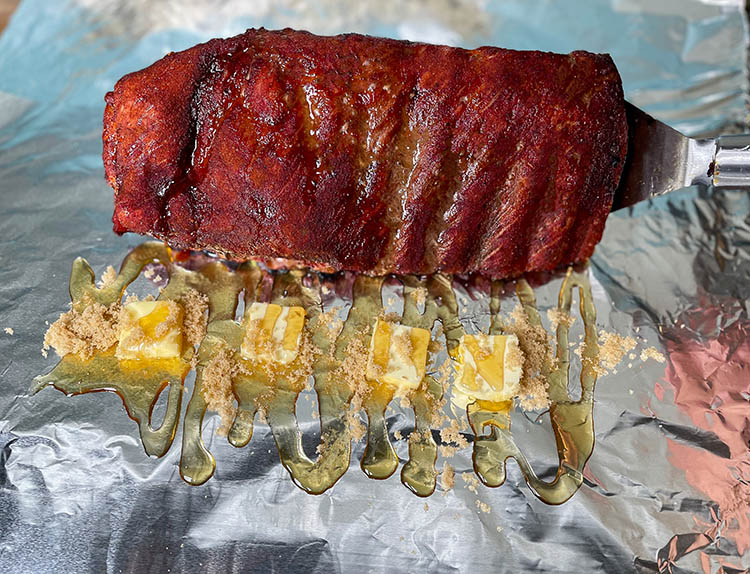
Wrapping your ribs allows you to add extra flavor that would be impossible otherwise.
When should you wrap your ribs?
You’ve probably heard of the 3-2-1 method for cooking ribs: three hours open, two hours wrapped, and one hour open again to allow the bark to reset and to tack up the sauce.
While this method is extremely popular, I don’t think it’s as foolproof as some people claim it to be. Depending on how well done you like your ribs, you may want to wrap them at different times.
If ribs spend too long wrapped they can become mushy, and that’s almost as bad as undercooked.
If you want that competition-style bite in your ribs, don’t leave them on the smoker for 6 hours. You should probably wrap them around the two-hour mark and let them sit in that wrap for 1½ to 2 hours max.
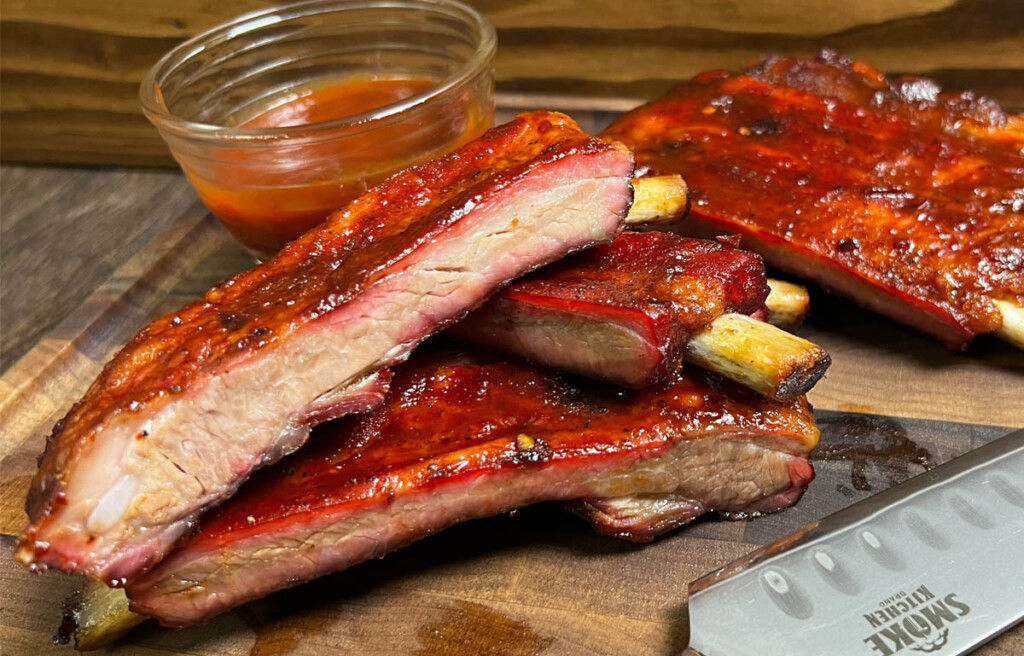
Competition pork spare ribs
If you prefer the fall-off-the-bone style of pork ribs, then the 3-2-1 method may be exactly what you want.
I typically cook based on feel rather than time. Here are a few things I look for to know when it’s time to wrap my ribs:
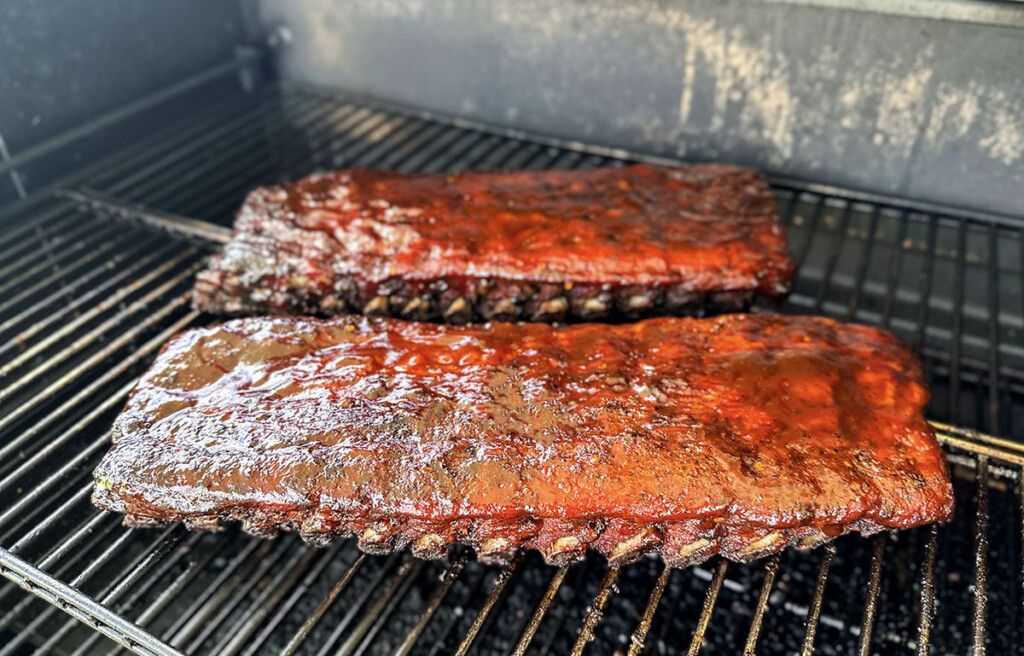
- Bones – as ribs cook, the meat will shrink on the bone, and you will see the bones begin to stick out of the meat. When the bones stick out about ¼” from the meat, that is a good indication that it’s time to wrap them.
- Bark – bark formation is important during the first 1-3 hours of cooking ribs. If you wrap them too early, you can lose all of the bark you built. You want to make sure that your bark is firm and solid before you wrap your ribs. You should be able to poke them with your finger, and little to no rub should come off.
What should you use to wrap ribs?
Nine times out of 10, when I’m smoking a rack of pork ribs, I wrap them in foil. Butcher paper is a popular choice for cuts like brisket and beef ribs because it lets air circulate during the cooking process, but I find that with pork ribs and pork shoulders, I prefer a foil wrap.
Aluminum foil is great for wrapping ribs because:
- Holds in moisture – foil, unlike butcher paper, won’t soak up the moisture in the meat. Instead, it will pool at the bottom of the foil and allow your meat to soak up all of that moisture while it cooks.
- Added flavor – in addition to holding in the moisture of the meat, you can also add flavor when you wrap ribs in aluminum foil. For example, you can add butter, brown sugar, and honey before you wrap the ribs, and all of those flavors will soak into the meat while it finishes cooking.
- Braising the meat – aluminum foil also allows the meat to braise while it’s cooking. Butcher paper allows air to flow freely in and out of the wrap, but the foil locks in all of that steam and moisture. This will braise the meat and yield a more tender, juicy, and flavorful rib.
If you’re not a fan of foil and you want to use butcher paper to wrap your ribs, that’s totally fine. However, I would argue that if you do that, you may as well just let them ride unwrapped on the smoker, like our smoked no-wrap baby back ribs, so you don’t lose any of that smoke flavor you’re looking for.
Can you skip the wrap?
Of course! You don’t have to wrap your ribs in order to achieve great barbecue, especially if you want dry-rub ribs. If you want to skip the wrap, that’s totally fine. Just let the ribs cook until they are done.
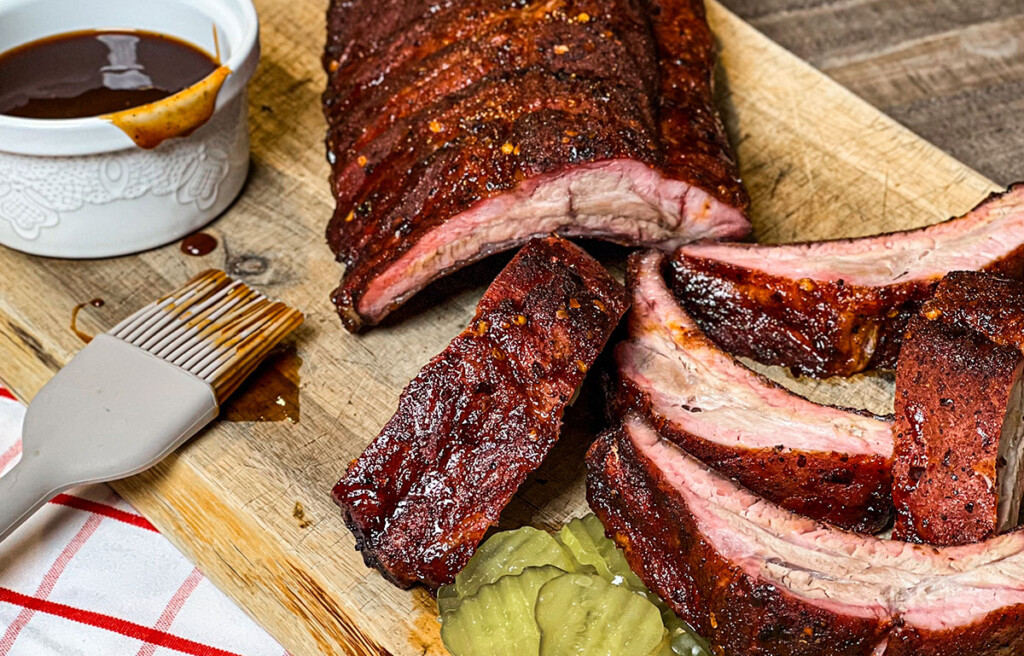
Smoked no-wrap baby back ribs
Skipping the wrap will give you a deeper smoke flavor on your ribs because there is nothing standing between the smoke and the meat during the entire cooking process.
No-wrap ribs are also great if you’re a big fan of that classic barbecue bark. A nice firm, almost crunchy exterior and soft, tender meat inside is the sign of a great no-wrap rib.
How do you know when the ribs are done?
There are a few common methods to tell when when your ribs are done. If you’ve smoked them for a few hours and then wrapped them for more than 1.5 hours, they will pretty much always be done after an hour unwrapped.
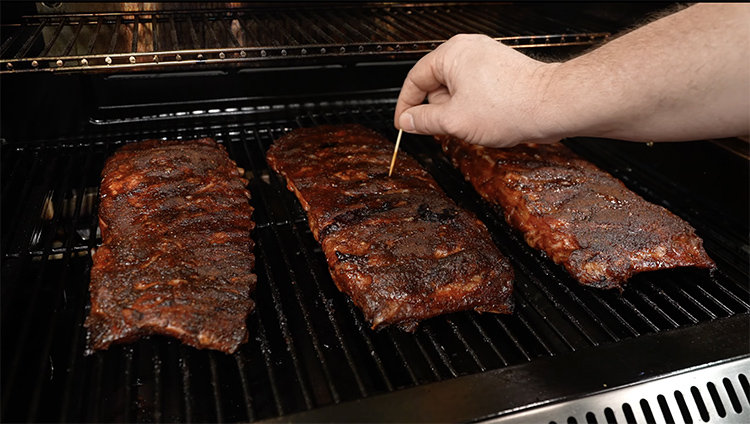
If you’re not sure, you can poke the ribs with a toothpick (or temperature probe). If it slides in and out without resistance, then your ribs are done.
Learn more about wrapping barbecue
When, how, and why we wrap changes based on what you’re cooking. We’ve written similar guides for the other main barbecue meats, so check them out next.
Did you miss our previous article...
https://manstuffnews.com/backyard-grilling/smoked-green-bean-casserole-with-homemade-mushroom-soup-on-the-traeger
 Backyard GrillingWeekend WarriorsAdvice from DadBeard GroomingTV Shows for Guys4x4 Off-Road CarsMens FashionSports NewsAncient Archeology World NewsPrivacy PolicyTerms And Conditions
Backyard GrillingWeekend WarriorsAdvice from DadBeard GroomingTV Shows for Guys4x4 Off-Road CarsMens FashionSports NewsAncient Archeology World NewsPrivacy PolicyTerms And Conditions
